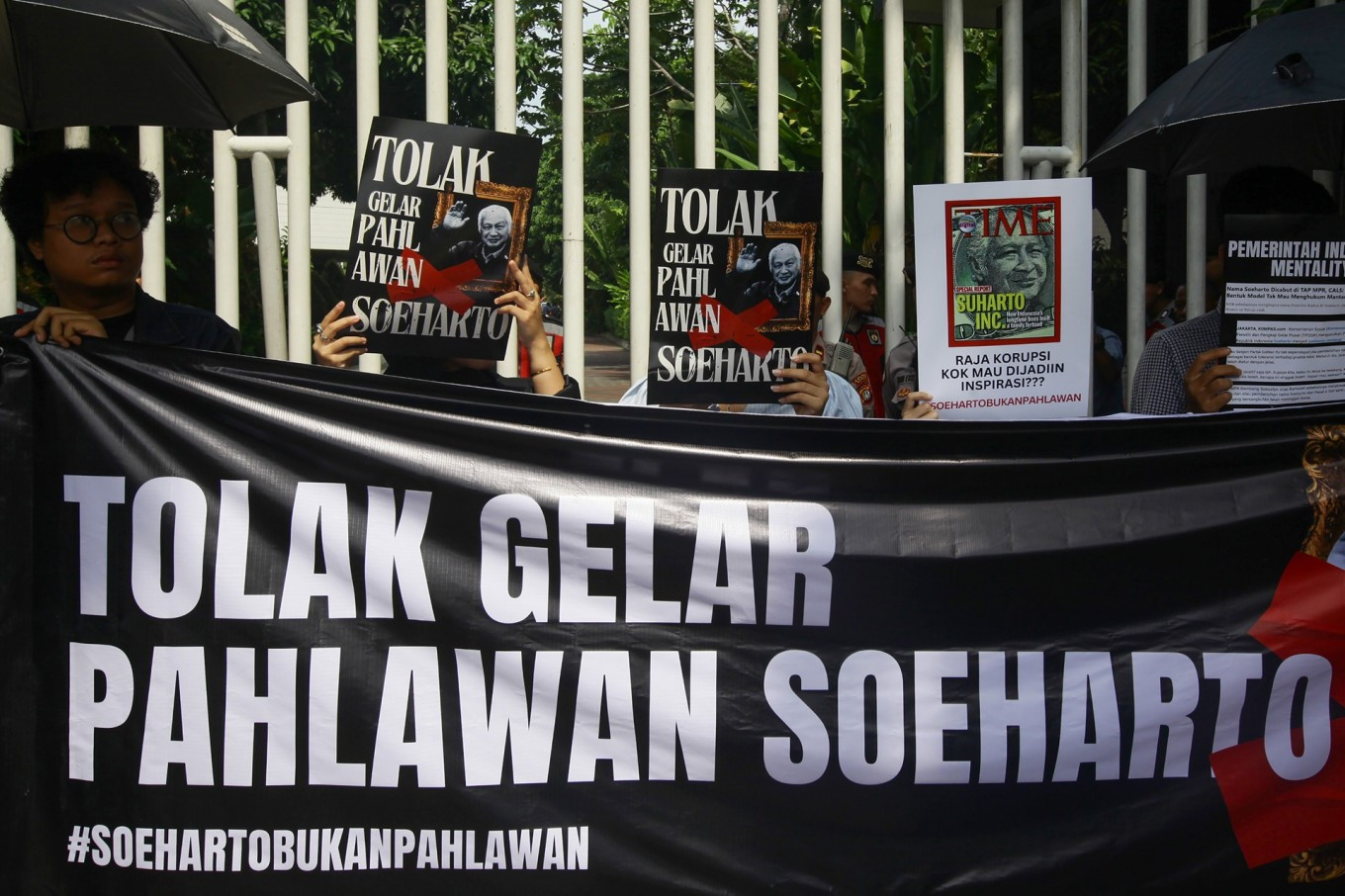News
Soeharto, national hero? Rehabilitating corruption, repression
Tenggara Strategics November 5, 2025 Protesters hold banners that read “Reject the national hero title for Soeharto” during a protest on May 15 in front of the Social Affairs Ministry's office in Jakarta. (Antara/Reno Esnir)
Protesters hold banners that read “Reject the national hero title for Soeharto” during a protest on May 15 in front of the Social Affairs Ministry's office in Jakarta. (Antara/Reno Esnir)
Barring any last-minute political twists, President Prabowo Subianto 's administration appears poised to crown Indonesia's second president and Prabowo's former father-in-law Soeharto as a national hero. The move would mark a dramatic turn in the country's reckoning with its authoritarian past, as no previous president had dared to officially honor the man whose 32-year rule was synonymous with repression, corruption, and nepotism.
Soeharto's name tops a list of 40 figures nominated by the Social Affairs Ministry, alongside his political rivals, the fourth president Abdurrahman "Gus Dur" Wahid and former Jakarta governor Ali Sadikin, as well as slain labor activist Marsinah, who was murdered during Soeharto's rule. The final decision rests with Culture Minister Fadli Zon, Prabowo's close ally and head of the Council for Titles, Medals and Honors. Fadli has said all nominees meet the criteria for hero status and promised to announce the selections before National Heroes Day on November 10.
The inclusion of Soeharto's name has triggered sharp backlash from civil society groups, human rights activists, and survivors of state violence. Protesters have gathered outside the Social Affairs Ministry, while online campaigns highlight the regime's atrocities. Under Soeharto's New Order, the military orchestrated some of the country's darkest chapters, including mass killings, disappearances, and extrajudicial executions, under the banner of stability and development.
The bloodshed began soon after Soeharto seized power in 1965, when the army blamed the Indonesian Communist Party (PKI) for an alleged coup attempt. In the ensuing purge, hundreds of thousands, possibly millions, of Indonesians were killed by the military and allied paramilitary groups, many for nothing more than being accused of leftist sympathies or Chinese descent. Historians estimate the death toll at anywhere from several hundred thousand to 3 million.
Two decades later, bodies again turned up in cities across Java and other regions in what became known as Petrus, short for "mysterious shootings". The regime at first blamed gang wars but later admitted to orchestrating the killings as a "shock therapy" to deter crime, another example of how Soeharto wielded fear as a political tool.
Rehabilitating Soeharto's image as a national hero risks normalizing those abuses and rewriting history. It would signal official forgiveness, not only for the massacres and political repression, but also for the culture of collusion and corruption that flourished under his rule.
Soeharto's regime blurred the line between state and personal enrichment. He granted monopolies, licenses and contracts to allies and cronies, most notably Liem Sioe Liong, founder of the Salim Group, in exchange for loyalty and financial backing. According to Liem Sioe Liong's Salim Group: The Business Pillar of Suharto's Indonesia by Richard Borsuk and Nancy Chng, their relationship epitomized the fusion of power and money that sustained the New Order.
The Cendana family, named after the street of Soeharto's Central Jakarta residence, became a symbol of elite privilege and impunity. Transparency International later named Soeharto the most corrupt leader in modern history, estimating he siphoned between US$15 billion and US$35 billion during his three decades in office.
Among his children, youngest son Hutomo "Tommy" Mandala Putra, known for his flamboyant lifestyle, became the embodiment of New Order excess. His Humpuss Group expanded rapidly thanks to government patronage, and he secured lucrative monopolies such as the clove trade. His PT Timor Putra Nasional, appointed to lead the "national car" project in 1996, received vast sums in public and private funds, much of which went to importing foreign cars and rebranding them as domestic products.
If Soeharto is officially elevated to the status of national hero, the decision could also serve as a symbolic rehabilitation of the Cendana clan. The family largely retreated from public life after Soeharto's 1998 downfall but has gradually reemerged. The most politically active member today is Siti Hediati Hariyadi, better known as Titiek Soeharto, Prabowo's ex-wife and a Gerindra Party lawmaker who now chairs the House Commission overseeing agriculture, environment, forestry, and maritime affairs.
For critics, honoring Soeharto would be less about recognizing historical contributions than about political convenience, cementing Prabowo's ties to the New Order legacy and appealing to voters nostalgic for perceived past stability. But for those who endured his rule, it would represent a painful erasure of memory and justice.
When National Heroes Day arrives in less than two weeks, and if Soeharto is named national hero, it will not only elevate one man, it will also restore the prestige of a family and an era defined by authoritarianism. The "smiling general" may once again be etched into Indonesia's official narrative, not as a warning from history, but as a model of power.
What we've heard
Since Soeharto's nomination, concerns have abounded that it could open the door for the Cendana family's return to national politics. However, senior officials say that in fact, it has already regained a foothold through certain members since Prabowo took power. One example is Prabowo's ex-wife Titiek, who now chairs House Commission IV.

